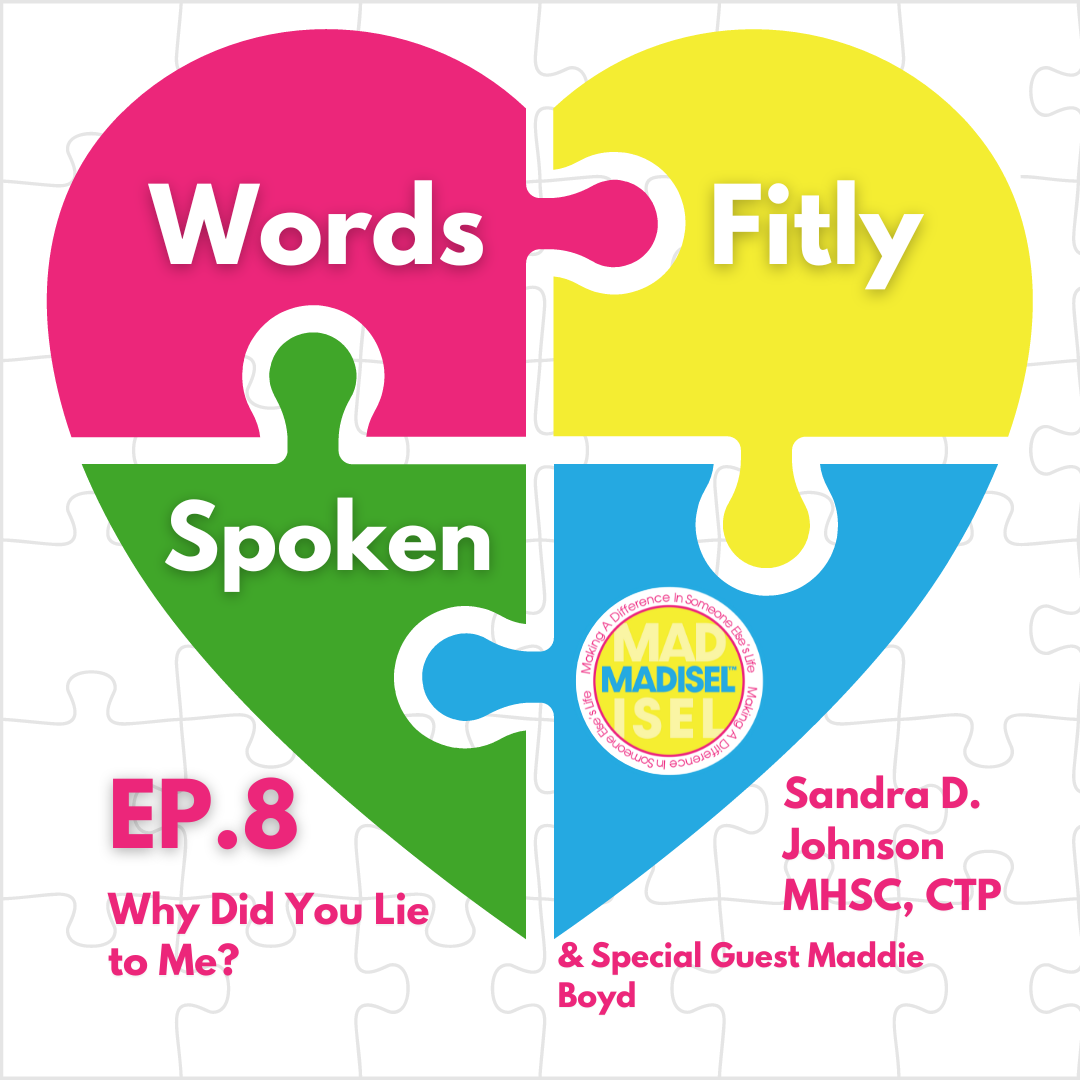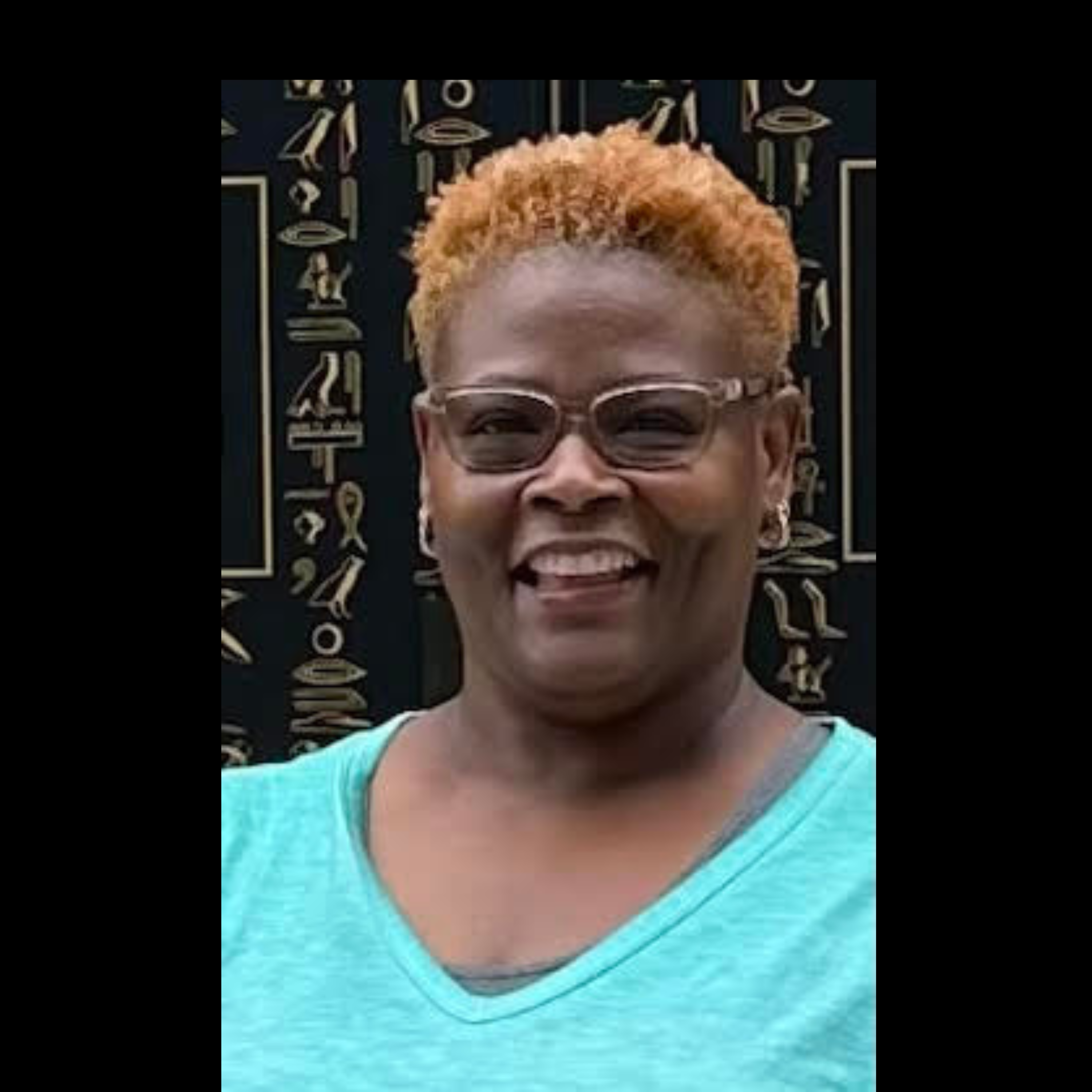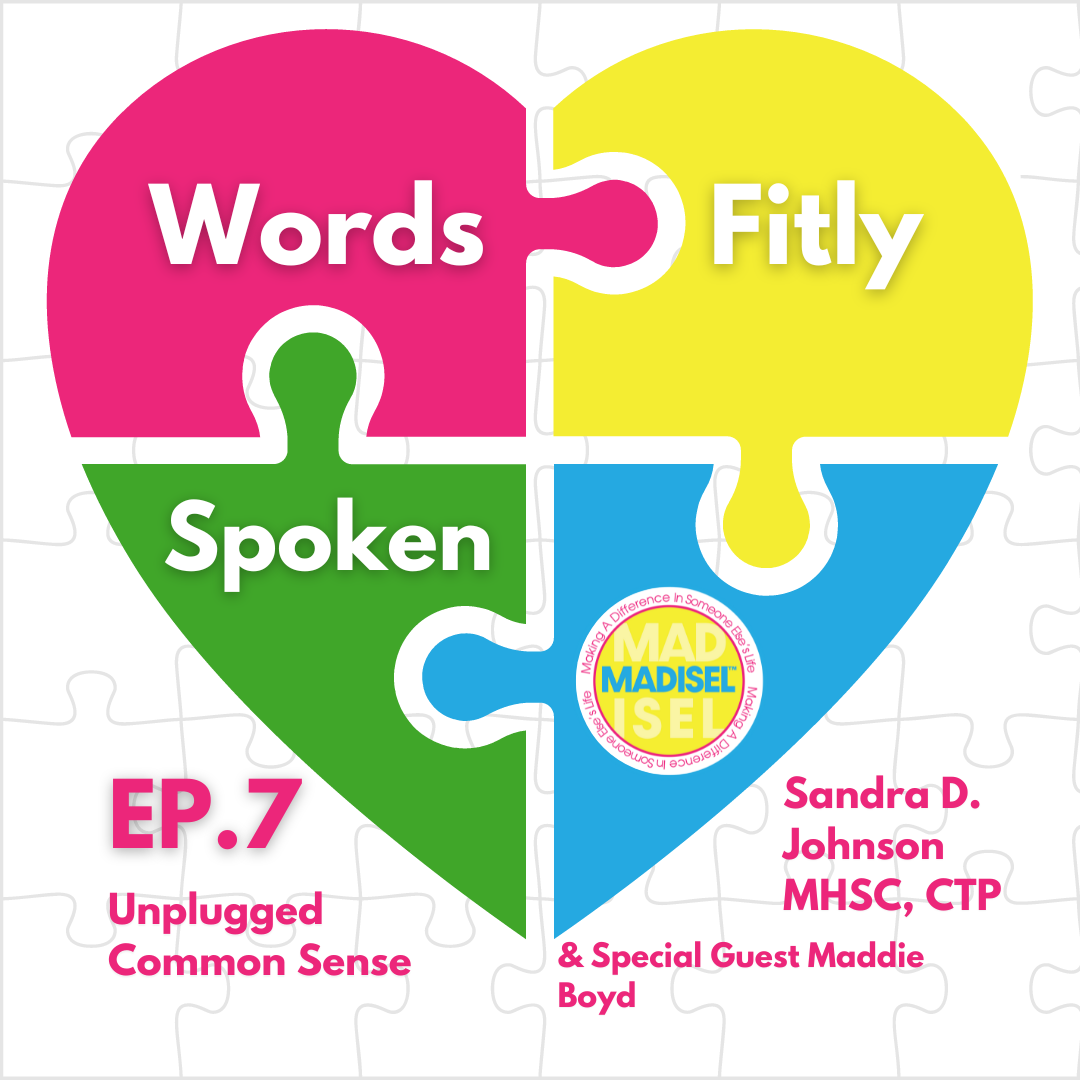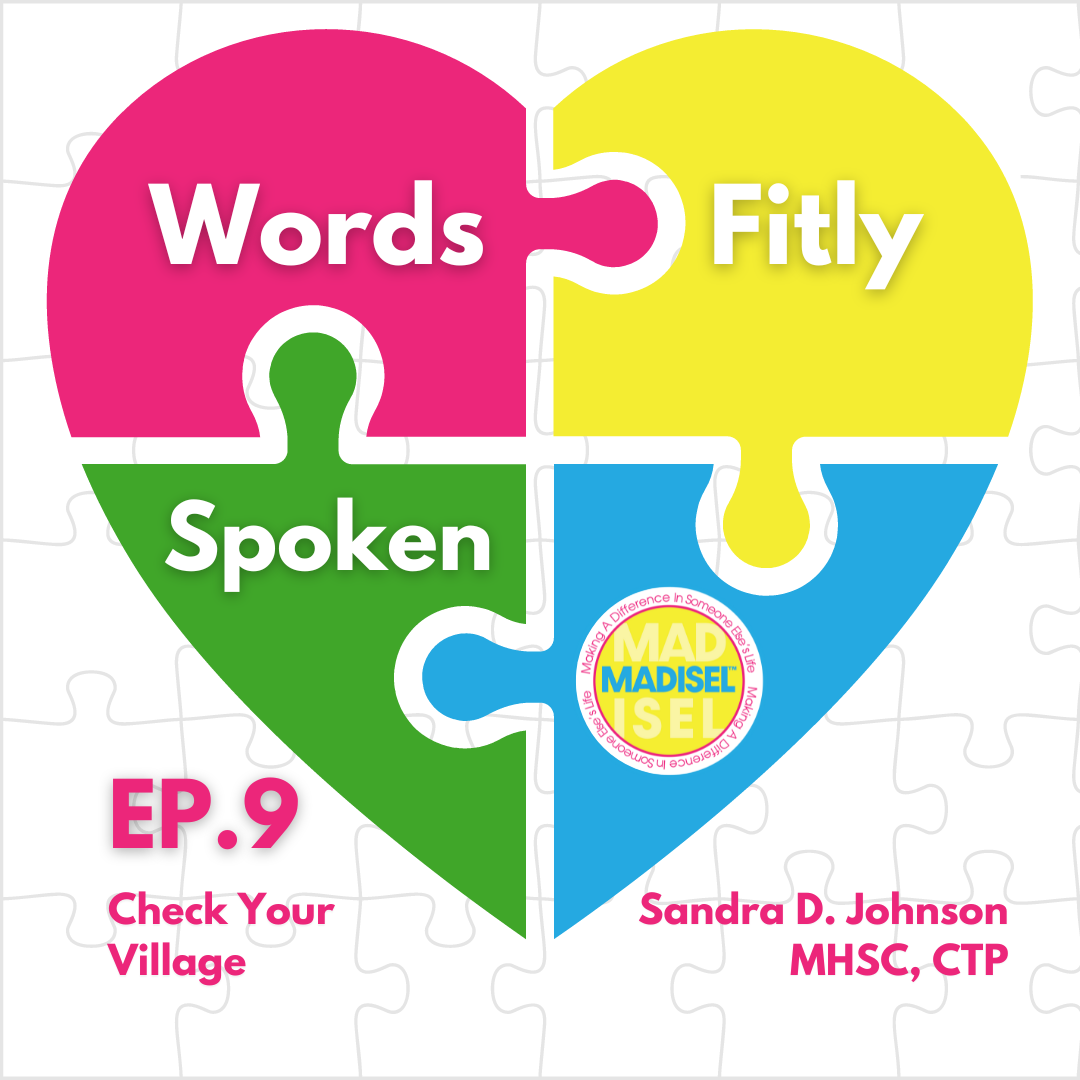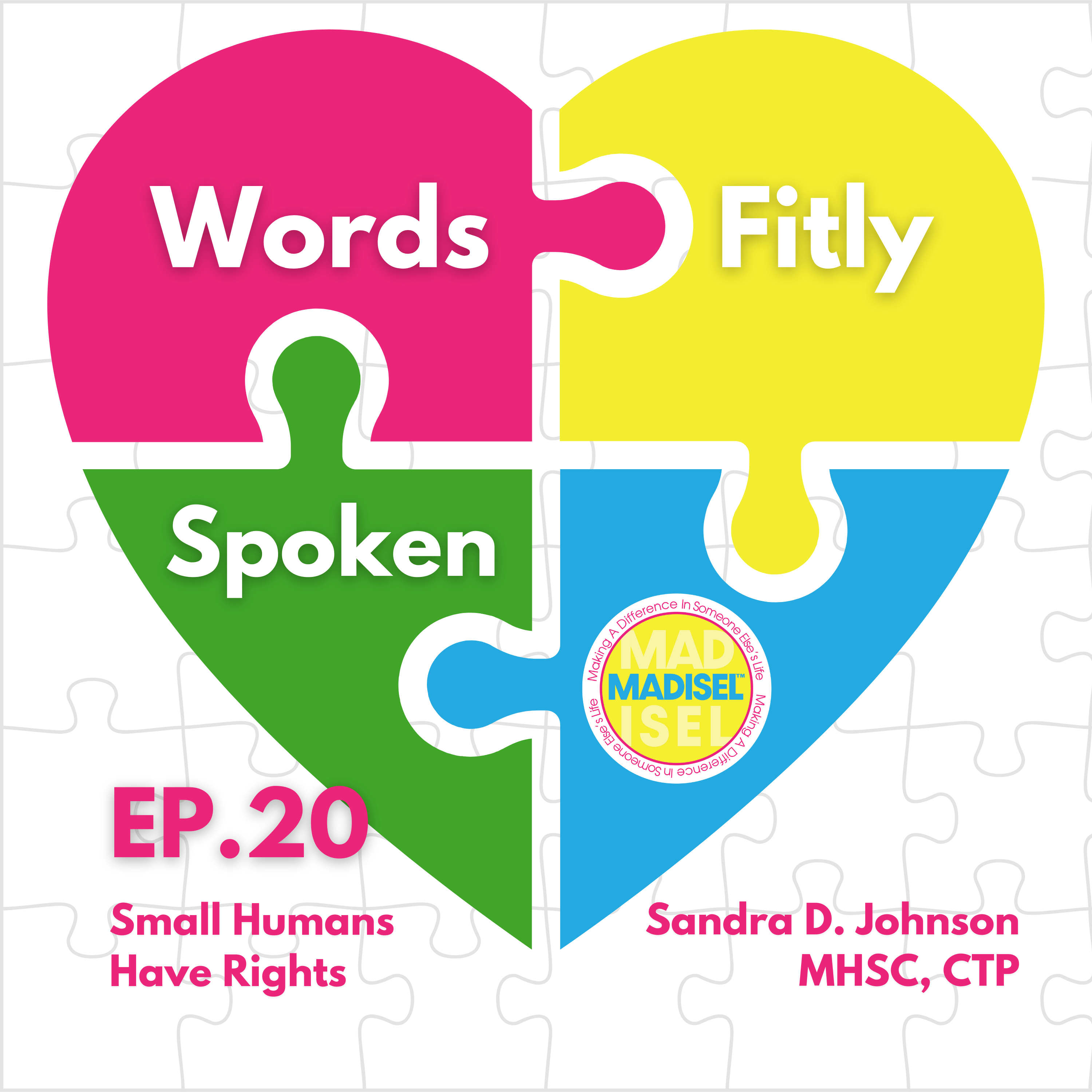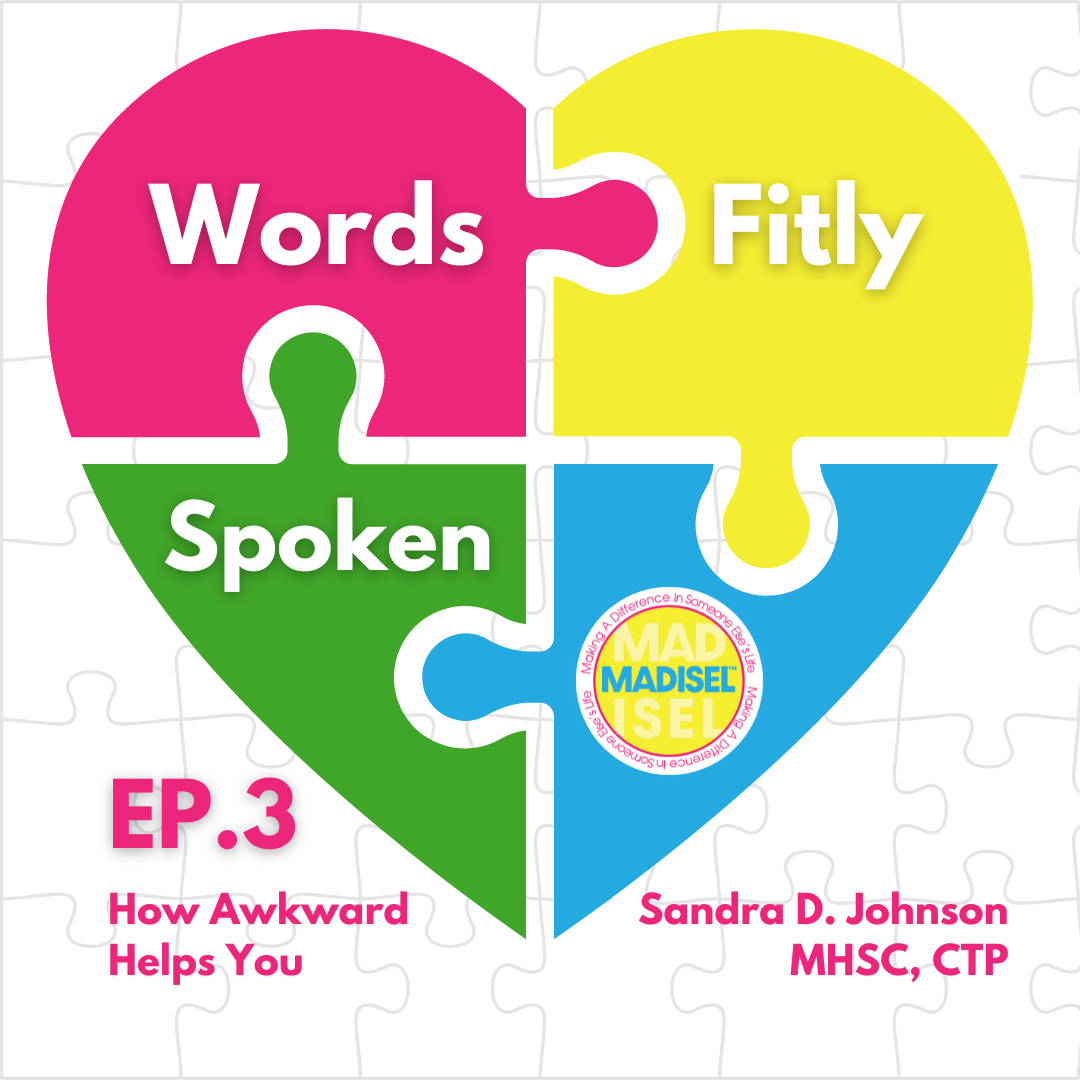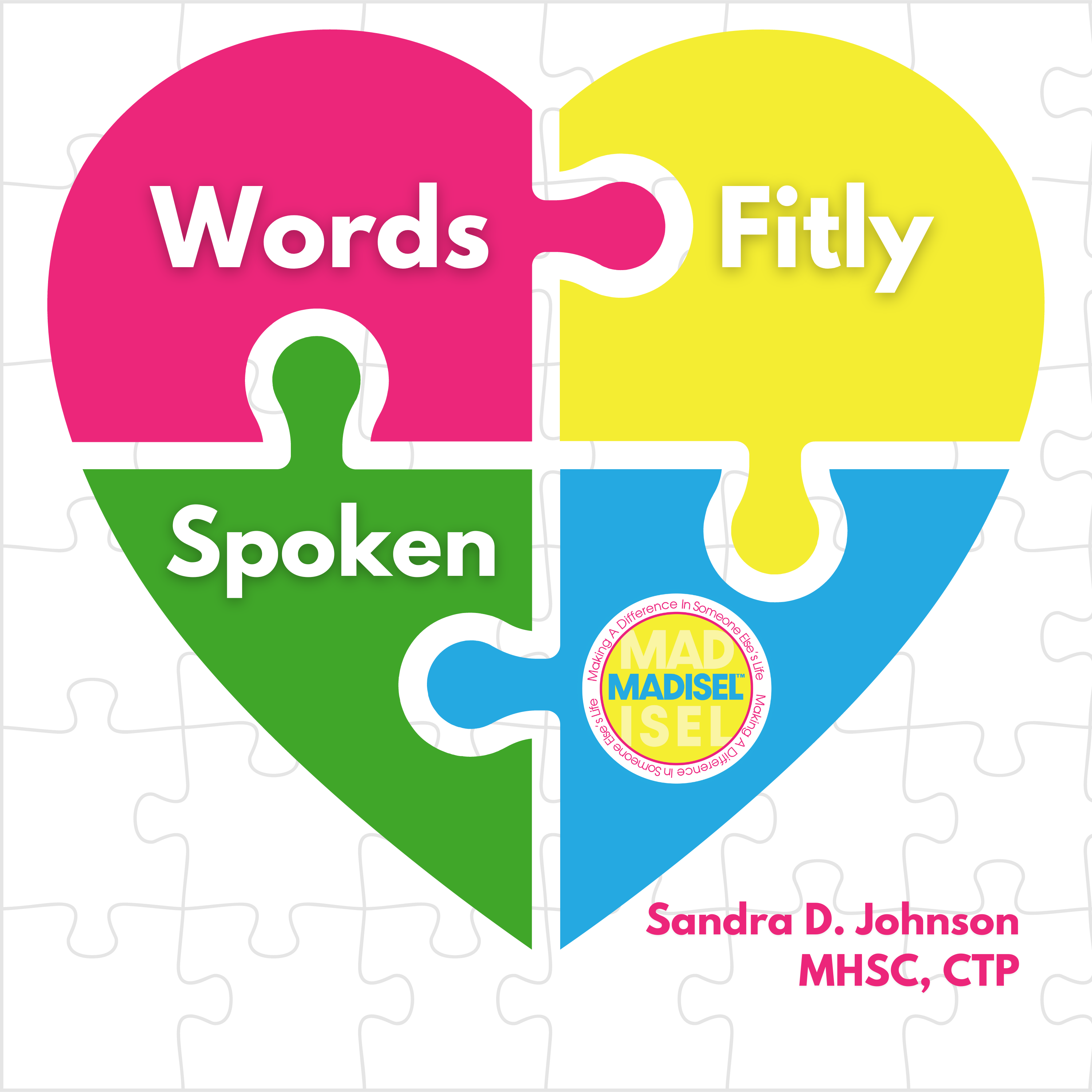Special guest, Maddie Boyd continues our great discussions about life relationships, judgmental behaviors, and the entanglements of dishonesty. We are all very offended about being lied to. Let’s talk about why this is destructive in our relationships.
View Full Transcript
Episode Transcript
Welcome to at MADISEL Coach and MADISEL TV's Words Fitly Spoken podcast. Hello there. I'm Coach Sandra, and I'm the host of Words Fitly Spoken podcast. Words Fitly spoken are words spoken at the right time for your encouragement and enrichment. On this podcast, we will deal with emotional and mental wellness by talking about the conflicts we have in our everyday relationships, whether at home, work, school, and the community.
Stop in to hear some helpful words that create awareness about your emotional health. Let's go ahead and deal with this. Uh, Maddie and I have this thing about, um, while we're dealing with some stuff about, um, the elephant in the room mm-hmm. And sometimes there's an elephant in a room or in a situation because of the topic of lying.
Yeah. So let's deal with lying. Okay. Okay, let's get into it. Let's get into it. Thank you so much. Um. Anybody in the room who's never told a lie, would you please raise your hand? Nobody's hand goes up. Mm-hmm. Right. Because okay. Lying is common. If we wanna go ahead with that. There you go. That's common. Yeah.
Uh, but oh boy, we, we don't wanna deal with that commonality. Right? Yeah. Alright, so, um, what I, I, I like to write in some, I try to be a little creative, but I, I use some of the thoughts that. We've all had. So you lie, don't tell lies. These are things that we've heard. Right. Big fat liar. I'm not sure why we had to Yeah.
You know, like, why does it have to be descriptive? Yeah. You know? 'cause a lie is a lie is a lie. We even have, um, well it's just a, a little, a little white lie, right? Um, well it wasn't, it's not a big deal. Ah. Any lie is a lie. Yeah. Right. And what I also have learned over the years is that when we do tell lies the lie, you have to tell another lie to cover up that lie, which has to cover up the other lie.
Oh, it's, and you're just digging yourself a hole deeper and deeper and deeper. It's exhausting. It is. It's, it's exhausting. And the last ones I put on here is the lies we tell and the lies we believe. Ooh, that is, that is something, yeah. So, you know, when we're, if we are truly honest, um, we all have heard, and we've participated in lying and lying behavior.
Mm-hmm. So someone has said to me, you know, coach Sandra, uh, what does lying have to do? With my emotional and mental health. And you guys know here on our podcast, we wanna deal with the emotional and mental wellbeing issues. So let's, let's talk about that. Great question. Right? Um, so I'm gonna just talk about a few facts or some issues around lying, because I hear the complaint.
Mm-hmm. A lot, Maddie, from parents. Um, who, you know, say in, in their anger, in their disbelief, you know, uh, she's lying to me or he's lied to me, he lied to me again. And so I'm just looking at the, the, the student, um, young person, parent, child relationship, right? So we know, um, lying can be in any of our relationships absolutely.
Right now. So, um, and, and any time in life, but let's just look at when we're, what we're seeing with, um, a young person and their parents. So, like I said, I'm getting that, I'm getting that complaint and so I'm having to help. These parents process, one of the first things I do, I try to say to them is that the lying behavior is really not about you.
Mm-hmm. Parent. Yeah. Um, because what we do is we say, oh, they lied to me. Yes. You know, I can't believe, you know, they've lied to me. And so we take it so personally. Absolutely. Absolutely. We, and it cuts it, it cuts them. Right. Um, So I, I say, uh, when we're dealing with lying, there's some things that. Uh, we've gotta consider lying is never about the other person being lied to.
Um, okay, so we get very distracted because we are so offended. Like I said, when we are lied to now, we could pause right here and we could unpack some, some things about the other person who feels like they're lied to. Because what I. I think we also miss in this, like if we're in a conflict personally with us, right?
Um, the highly offended person mm-hmm. Or the highly offended self is usually soaked in judgment Yes. Of others and they're mis and the mishandling. Of equality, right? Mm-hmm. You're not seeing the person as equal. And so you say, I can't believe they lied to me. Yeah. Because I am up here. They're not, they lied to me.
Mm-hmm. Uhhuh. So we, and that's not healthy, but we're not gonna unpack that necessarily fully. We can toward the end of our conversation, um, Due to being offended by the liar and the lying, we often put the focus on the wrong thing the wrong way. Here's what I mean about that, and then I'm gonna let you, you speak to this topic.
Okay? Okay. I think that lying is very personal to the person who is lying. Mm-hmm. And it really. When we unpack it, it communicates insecurity about the person who is speaking lies. And so, and I think this person, no matter what their age is, um, when they're telling a lie, I. They could be feeling uncomfortable, they could be fearful.
They could even feel ashamed. This is just a few examples about whatever the something is right, that they are lying about. The lying, whatever the, the issue of the lying behavior. And so the lying. Becomes like a protective shield. Yeah. I put up a, a shield for myself. Right. And 'cause I know, I think you were gonna talk about the issue of trust and I, like I said, I'm gonna let you jump in on this.
Okay. Um, and I think what happens with that protective shield, that it does create like an emotional safety space or safe space for the moment. Um, and again, if we just. Try not to get distracted by the whole idea of the lie and look at why, what, yes. What's really happening. Absolutely. So go ahead, speak to that.
Yeah. I think that's the most important part about when somebody lies to you, and I've been in situations like this, where you're so hurt over the fact that they lied, that you're not even thinking about A, what they lied about, or B, why they lied. You are just so caught up in the fact that you just got lied to that.
You just completely dismiss anything else. And of course you're going to be mad at the person that lied. Right. But realistically, you have to dig into why they lied to you, what's going on. Exactly. A, like you mentioned, they might feel ashamed. They might be in a situation where, They felt they had no, nobody to turn to.
Yeah. And then you have to look at yourself. Why does my, you know, if we're talking about parent and child or in any relationship, Why does my person feel that they have to lie to me and why don't they trust me? And what, and maybe what am I doing? Yeah, that's good. To show them that they can't trust me. Am I saying things that hurt them in ways that I don't know?
Am I making them feel demeaned about something? And so when I'm already demeaning you about one thing and then that same topic comes up, you're gonna lie about it. Because you don't wanna be demeaned again and again. You're not gonna keep telling me the truth of, you know, well, I, I got a B on a test and I'm like, as a parent, I'm going off about how you need to get an A.
Well, then you get a C on a test. Yeah, now you're lying. Yeah. And then that lie turns into another lie, and now you have academic failure. Right. And it's like just from one judgment, right. It like scares someone so badly to where it can turn into a completely out of control like situation. Right. And what I heard as you're saying it, like.
That protective shield. Yeah. I'm putting up a shield and yeah, it's lying, but that's the only place I feel safe. Yes, right. I feel safe in that lie because your condemnation is so heavy. Mm-hmm. Condemnation, demeaning Again, judgment is the same stuff. Yeah. We don't realize how much weight. Power is in those moods, right?
Yeah. That will come into the relationships. Yeah. And I love how you said with your person, so it could be at any level if we are carrying that ugly about us. Mm-hmm. Um, they always know, um, person's gonna be, you know, my, my person, my adult, my support. They're gonna have something negative to say. Yeah.
They're always gonna be demeaning, they're always gonna be, um, belittling of what my ideas are. So why would I keep bringing my ideas? Mm-hmm. I don't have any ideas. Well, I'm lying. Yeah. I have ideas, but what I'm saying is I can't trust you with them. Absolutely. Because you are destructive in how you treat me in our relationship.
Yeah. And on the other hand, it could just be extremely high expectations of that person that. They never even agreed to meet. Excellent. It's, it's just this like idea that a parent or somebody in a relationship has set these expectations on you. Yeah. And you never even agreed to that. Yeah. Or, or thought yourself that you could uphold them.
Yeah. And so why am I trying to meet this almost ever moving bar that I can't reach? Oh, that's rich. That's rich. And so my mentor actually was, uh, um, Listening to some things from my mental health mentor, and that's one of the topics that was brought up about this mutually, um, mutually accepted expectation.
So if I'm, if we mutually agree, I. So, you know, here it is. We're in a relationship, Uhhuh and, and you're, you're interning with Mattel and here I've got all these things in my head. Some of them I tell you and some of 'em I don't. But I never really say, Hey Maddie, is this something that you can do? Yeah.
Because we have to mutually agree. Absolutely. That expectation two, three, and seven. You're good with. Yeah. But those other ones, they don't fit where you're at. They don't fit your skillset, and they may be outside of the boundary of what you're willing to be stretched at. Right, right. So be And that's totally fine.
Yeah. If we're, if we're in a healthy relationship, if it's work, if it's school, if it's home, it doesn't matter. It still has to be mutually agreed upon expectations. Yes. So I love that you highlight that because I know I see a lot of it in our homes. Yeah. I see a lot of it in, um, you know, um, love relationships or, or romantic relationships.
This, you know, this person wants that and that person says this and they never really agree to anything and then they get mad because, You just, you, you just don't meet my expectations. It'd be a good idea for you to communicate them. Absolutely. Communication. I just, I mean, I love that the mutual agreeing on it, expectations, and I think you should bring that into almost any relationship that you're pursuing, whether it's romantic, you know, family work, because when someone has expectations and you're in a relationship with them and then you let them down.
That also hurts you. It does. And so not only are you not meeting their expectations, and so now they're upset, but now you're hurt because all of a sudden you think you are not good enough. Excellent. And so I agree. Expectations without communication is the problem. That's it. Because expectations alone are fine.
I expect you to, you know, always be loyal to me or I expect an apparent. Relationship, I expect you to do the dishes, right? Those expectations are completely okay, but for you to not communicate them is the problem. Because as a kid, you have a million things on your mind, right? Whether you're, well, mostly teenagers especially, are you thinking about doing the dishes?
Probably not. And so then mom comes home, the dishes aren't done, but she never told you. So now you are getting yelled at because the dishes weren't done right. And it's like this confusing situation where you're like, well, I didn't even know you wanted me to do the dishes and now I'm getting yelled at.
Now I feel less than unworthy, upset. And it's just a strain on the relationship. Right. Which can lead to many other things and lead back to lying. That's right. Did you do the dishes? Yeah, I did them. Right. Right. And then you come home, the dishes aren't done right. That lie on top of the unmet expectations.
You're done. Right. And then in that scenario you just painted. We never get to the root because the parent comes home and says, you told me in the text that you did the dishes, so, oh, we're lying to each other now. Yep. Oh, you lied to me. Mm-hmm. I can't believe you lied to me. And they're so on that lie.
They don't know that their young person's been struggling all day with. Depression. Mm-hmm. Uh, bullying. Yep. Just using any suicidal ideations. Anything could have been going on, like you said. Yeah. There's 101,000 things going through the mind of a young person because they're in transition. Absolutely.
Right. And. N we don't take out time to understand. They're going through a lot. Yeah. It doesn't mean that we are not, it just means I need to know that they are. Yes, they're going through a lot. We all are. But sometimes I think as the adults, we sometimes are so distracted about our big things. We forget that our family members, our young people, our people, our person, They got stuff going on too, and I need to be there to make sure I'm listening and understand, you know what, even though a lie may have brought us to this place, we're here now, what else do we need to talk about?
Right? So we've got the lying and you know, communicate that hey, son, daughter, young person, spouse, you know, partner. Yeah, I'm really hurt because I was lied to, right? I also wanna know what's behind it. Yeah, absolutely. And I don't think I've ever been asked that, have you? No, and that's, that's the problem.
Because honestly, I think that in my experience with someone who lied to me, yeah. If I would've just dug deeper with what they lied about, I think that it truly could have helped us a lot more than just holding the lie against them for so long and holding onto that lie that. It's okay to be hurt by the lie.
A lie is always going to hurt. It is, absolutely. It's real. Yeah. But it's your job as a individual to really look in yourself and then examine your relationship and ask, you know, why did this happen? Why don't they trust me? Yeah. And that's hard. And that's, yes. You have to let go of your ego. You have to let go of the hurt.
Yeah. And if you're not capable of letting things go, I mean, it's, it's tough. But yeah, the only way to save and fortify your relationships is being able to let go of things and really dig in deeper past the hurt and past the immediate reaction that you have. Yeah. That's good. That's good. I love that. Um, you have hit some great spots and, um, I don't know.
We don't, I don't know that we need to go deeper because this is good. This is some good stuff. Even if it's just the beginning of us talking about lying. 'cause I'm sure these kinds of topics will come up again. Right. Um, it's, it's a great place to be and just processing, Hey, ask that question. This is for everyone.
Ask that question. What's behind the lie? Mm-hmm. Go beyond the hurt, like you said, get get behind, get, get beyond that. And what happens with us is we will hang out at the hurt place. Yes. I mean, we will build, build a whole tent, a whole dwelling pace. Right. A whole house. We are there. Yeah. We are perched up there.
I have been offended. Mm-hmm. I have been hurt. Okay. You got that out of the way now what? Yeah, because if I stay there, It's like sitting, soaking and souring. Mm-hmm. Right. You don't wanna be sour milk. Who wants to be sour milk? I would hope no one wants that. Even if you're lactose intolerant, um, you don't want sour, you don't want sour milk.
You don't want rotten apples or nothing. Anything like that. So whichever example you need to put on it, don't stay there and become rotten. Yeah, absolutely. Go ahead and feel all of it. Communicate all of it. Also understand communication is about listening. Right? We're gonna bring up communication next time, so I'm not gonna go too deep into that.
You see how one topic can lead us into another topic? Yeah. Maddie, we'd be here all day just kind of talking. Our throat would be gone, right? Yeah. But we're gonna go ahead and wrap up, and I just wanna say thank you again. Do you have any last statements you wanted to make? No. I'm just so glad that you had me on and I mean, this is really fun and it was a great experience.
Excellent talking to you. Just opened my eyes to so many more things and I've truly just gained a lot of perspective from you. Thank you for my life in the future, and it's just truly a blessing to be on here with you. Hey, thank you so much. I am honored to have you, um, you bring a lot to my journey and my life as well, so I thank you young adult for what you are committed to do in the universe.
So many more great things are ahead. I know. So I know. I, I'm, I'm excited to be a small part of that in setting you up for what is coming in your future. And so thank you for stopping in here. We're obviously gonna have you back. We're gonna talk more, we're gonna bring some more friends around. This podcast time is about us dealing with real life, our topics, our journey, our ups, our downs, our ends and outs.
So we just wanna remind everybody please. Look for us. You see we have our logo on there. We have our website on there, www.themadiselgroup.com. But you can find us on social media at MADISEL Coach, we want you to like this podcast. We want you to subscribe to whatever channels you find us on. On YouTube, it's MADISEL.tv.
Subscribe and share it. Absolutely share it. You're welcome to drop your comments 'cause we know we hit some really hot topics that all of us deal with, so thanks. Thanks, thanks, and we look forward to having you back again. Bye-bye. Bye.
